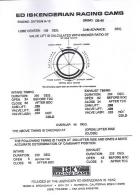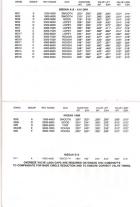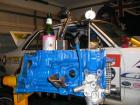Checking and adjusting the camshaft timing is an important part of a competition engine. You can also do the same for your street 1200 to ensure you are getting the expected performance.
Also see Camshaft Comparison
Contents |
Overview
Find TDC
- One dial indicator on piston head
- Through spark plug hole
- or, directly if head is removed

NOTE: You can also use a piston stop to find TDC
Advance crankshaft (turn clockwise) until lifter comes up 0.050":
- Second dial indicator on pushrod, to measure cam lift
- Timing wheel to have 360 degree measurement
Note the degree at which 0.050 lift occurs
Continue turning and note maximum lift. Compare to the camshaft specification sheet that comes with your camshaft. Or to the factory specifications below.
Check each lobe the same way to see if any lobes are worn.
Fine Adjustments
Advance or retard the camshaft using:
- offset key for cam pulley
- or, adjustable cam pulley
Modified timing cover to suit adjustable cam gear

Retarding the cam moves the power band up in the RPM range
Advancing the cam lowers the power band in the RPM range.
Of course using the right camshaft is even better, but this technique can be used to see the effects:
- fine tune the cam to the engine
- fine tune the cam/engine to each particular track
- cover up a mis-matched cam
Slotted cam pulley for adjustment

Factory Specifications
See Camshaft Comparison for more details.
240/240 duration (A10 Datsun 1000) 248/248 duration (standard small bore A12/A13) 256/248 duration (standard large bore A14/A15) 256/256 duration (performance engines GX/A12T/EGI) 248/244 duration (1981-1982 USA)
248/248 as used by standard A12

248/248/14/54/12/56
Late-model

248/244/14/50/12/56
248/248/14/54/12/56
248/244/14/50/12/56
256/248/14/54/20/56
B310 Australia?

A14: 256/248
A12: 248/248
Aftermarket Specifications
210/199 Camtech "turbo" profile 600A68A-TURBO
246/239/14/52/4/55

228/228 Iskenderian D8-66
228/228/5/43/6/43
266/256/24/62/24/62

274/271 JTS 104CB
212/212/-2/35/-5/37

291/296 JTS 140-6
238/238/15/42/10/47

Smiths Regrinds (Mace Engineering)
0.050 specs not listed

Camtech Cams
618: 199/196 2000-6000 RPM
639: 210/210 2400-6400 RPM
621: 220/223 2600-6800 RPM
609: 231/235 3200-7200 RPM
608: 241/243 4000-7000 RPM
604: 250/253 4400-8200 RPM

JUN Camshafts
68, 72, 74, 76, 80, 82

74 Bprojects RACING CAMSHAFT 296-7.0
Usage: new-style A12 Duration: 74 (296) Cam Lift: 7.0mm (0.276") Cold Valve Clearance: 0.3mm (0.012") Valve Timing Centerline: 103.5(Deg) Wavy groove finish and Surface Coating *TOMEI Ouality Control
Valve Lift
Each manufacturer specifies this differently. The spec is valve lift (at the valve) but the cam lobe lift is amplified by the rocker arm ratio less valve lash:
Nissan: 1.44 ratio, cam lift not specified JTS: 1.5 ratio, but they also specify cam lift Camtech: cam lift only specified Isky: ~1.48 ratio
For example:
Nissan cam lobe in.: 1.426" std (wear limit: 1.4055") Nissan cam lobe in.: 1.187" base circle Nissan cam lift: ~0.239" Nissan Lash: ~0.013" Nissan ratio: 1.44 Nissan valve lift: 0.331"
Valve Lash
Aftermarket camshaft grinders recommend from 0.010" to 0.024" depending on the profile (standard lash is 0.013" warm/0.014" cold).

![[Datsun 1200 encyclopedia]](/wiki/upload/wiki.png)

